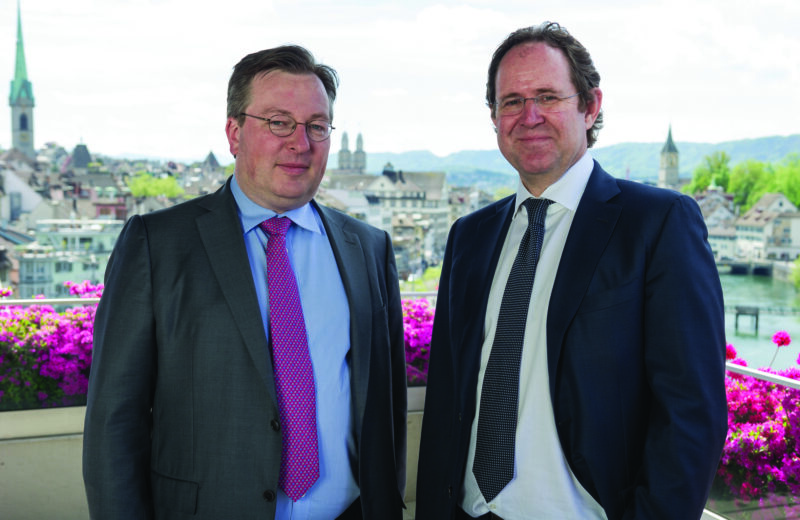Luxaviation buys ExecuJet to become world’s second largest business jet operator

Patrick Hansen, CEO of Luxaviation, and Niall Olver, outgoing chairman of ExecuJet
Luxaviation has become, the world’s second largest business jet operator after buying larger international rival ExecuJet Aviation Group from entrepreneur Dermot Desmond and ExecuJet chairman Niall Olver.
The new company has more than 250 business aircraft under management, 1500 employees and staff in 22 countries. Only NetJets, owned by Berkshire Hathaway, has a larger fleet of business jets.
“This is a transformative deal for us”
“This is a transformative deal for us,” says Patrick Hansen, co-CEO of Luxaviation. “It is the second time we have bought another company bigger than us – the first was Abelag in 2009 – but ExecuJet is really global, has a much larger fleet and changes Luxaviation and the business aviation market.”
“Patrick has the means, vision and – with ExecuJet – the right platform to consolidate business aviation,”
Niall Olver, chairman of ExecuJet, will leave the company after 22 years, although he will stay on as an adviser.
“Patrick has the means, vision and – with ExecuJet – the right platform to consolidate business aviation,” says Olver. “This is one of the most significant transactions ever in business aviation and the future for ExecuJet is exciting.”
Must read: Niall Olver leaves ExecuJet to focus on Grob
Gerrit Basson is CEO of ExecuJet with Hansen becoming chairman.
Luxaviation is aiming to manage a fleet of 500 aircraft and is looking for other acquisitions. ExecuJet’s international platform is a key part of this plan.
Until now, Luxaviation, which was only formed in 2009, has focused on buying leading domestic operators like Belgium’s Abelag, France’s Unijet and the UK’s London Executive Aviation.
“We have bought national champions,” says Hansen. “Now we have also acquired an international one which will allow us to grow in many countries.”
Must read: ExecuJet from South Africa to Luxembourg (via Zurich)
After acquiring these companies Luxaviation has typically allowed them to retain their own brands and existing management team (the one exception is Luxaviation Germany which was FairJet).
“Branding is a complicated matter.. but the name ExecuJet will remain.”
“Branding is a complicated matter,” says Hansen. “It involves client relationships, relationships with the local community and other issues. We will be looking at these issues in the next few months but the name ExecuJet will remain.”
Luxaviation has achieved savings by negotiating things like airport fees and fuel but Hansen says they can get more.
“I will always say that we can integrate faster but we are entering a completely different phase now, with ExecuJet we now have a global business with strong back office systems,” says Hansen.
Hansen says that Luxaviation only finished hiring its management team at the end of December – one of the last hires was Yves Germaux, the company’s chief financial officer who joined from cargo airline Cargolux – and that he now expects integration to be faster.
Until now Luxaviation has focused on operating aircraft, rather than maintenance or FBOs. ExecuJet changes this. ExecuJet business was fairly evenly balanced between operations and support.
Luxaviation approached ExecuJet in December with the deal signing on March 30.
The price that Luxaviation has paid has not been disclosed. Dermot Desmond, the Irish entrepreneur, acquired two thirds of ExecuJet in 2007 at the height of the business aviation cycle. Since then the industry has been hit hard, with new aircraft deliveries falling by 50%. Sources close to Desmond say he has been a profit on his investment in ExecuJet.
One rival operator, who had looked at acquiring ExecuJet believes that the multiple paid could have been as much as 10 times ExecuJet’s earnings.
“We have paid a multiple partly based on growth, not just earnings.”
Hansen did not wish to disclose how they valued the company. “We have paid a multiple partly based on growth, not just earnings,” he said. Olver was also not willing to comment.
Luxaviation was advised by Saphir Capital Partners, a specialist merger and acquisition adviser that has also worked on a number of other Luxaviation acquisitions. ExecuJet did not have external advisers.
Hansen says that the acquisition will be financed through European private equity. Luxaviation has also issued two bonds on the Luxembourg Stock Exchange. In May 2014 it raised Eu10 million with a five year bond paying at Euribor plus 4%. Eventually Hansen hopes to float Luxaviation.
Last week Luxaviation signed a strategic cooperation agreement with China Minsheng Investments (CMI), a Chinese fund which also owns two Asian operators Minsheng International Jet and Business Aviation Asia. Hansen says that the agreement includes financing.
“Asia is a key target market for us,” says Hansen. “We see lots of opportunities there – and, of course, ExecuJet is established there as well. The agreement with China Minsheng Investments is part of that.”
Luxaviation in numbers
• 1500 employees (ExecuJet: 1000)
• 250 business aircraft under management (ExecuJet: 165)
• 146 Aircraft available for charter (ExecuJet 72)
• 14 AOCs (ExecuJet: seven fixed wing and one rotary)
• 20 FBOs (ExecuJet: 19)
• 13 MRO facilities (ExecuJet 12)
• Presence across 22 countries (ExecuJet: 17)
Luxaviation’s history
• 2009 – Luxaviation gets it AOC in Luxembourg
• October 2011 – Buys Fairjet (Germany) – now Luxaviation Germany
• June 2013 – Acquires Abelag (Belgium)
• Jan 2014 – Acquires Unijet (France)
• May 2014 – Acquires LEA (UK)
• January 2015 – Acquires Masterjet (Portugal)
• May 2015 – Acquires ExecuJet (Global)








